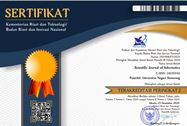Fuzzy Logic Inference System for Determining The Quality Assesment of Student’s Learning ICT
(1)
Abstract
The Assesment that held in the school is one of the learning process in education who do it by teacher. One of the course that exemined is Computer Application. In the computer application have 3 topic, they are Microsoft Word, Microsoft Excel, Microsoft Power Point. The assesment for student’s at politecnic about learning computer application have 3 criteria in the selection. First of all, the students have ability to operate computer system generaly, it has understanding the formula on microsoft excel, the students have skill toward any application. In this study, fuzzy logic used for determining the quality assesment of stundent’s learning Information and Comunication Technology (ICT) as a tools to analyze any constraint that are known as min-max method. As a result, we have found that the students have good for analyzing in the application from the each question or case of study when the course it has been examined.
Keywords
Full Text:
PDFReferences
Abdullah, S. L., Omar, M., Fazril, M., & Idris, M. 2011. Team Achievements Equality Using Fuzzy Rule-based Technique. World Applied Sciences Journal, 15(3), 359-363.
Amelia, R. 2013. Implementasi Metode Fuzzy Tsukamoto Pada Penentuan Harga Jual Barang Dalam Konsep Fuzzy Logic. Pelita Informatika Budi Darma, 5(2), 104-109.
Belohlavek, R., & Klir, G. J. 2011. Concepts and Fuzzy Logic. Massachusetts: Massachusetts Institute of Technology.
Djunaidi, M., Setiawan, E., & Andista, F. W. 2005. Penentuan Jumlah Produksi Dengan Aplikasi Metode Fuzzy – Mamdani. Jurnal Ilmiah Teknik Industri, 4(2), 95-104.
Haryanto. 2015. Pengembangan Computerized Adaptive Testing (Cat) Dengan Algoritma Logika Fuzzy. Jurnal Penelitian dan Evaluasi Pendidikan, 15(1), 47- 70.
Kaswidjanti, W., Aribowo, A. S., & Wicaksono, C. B. 2014. Implementasi Fuzzy Inference System Metode Tsukamoto Pada Pengambilan Keputusan Pemberian Kredit Pemilikan Rumah. Telematika, 10(2), 137-146.
Klir, G. J., & Yuan, B. 1995. Fuzzy Sets And Fuzzy Logic. New Jersey: Prentice Hall.
Kusumadewi, S. 2003. Artificial Intelligence ((Teknik dan Aplikasinya) . Yogyakarta: Graha Ilmu.
McNeill, F. M., & Thro, E. 1994. Fuzzy Logic a Practical Approach. Boston: AP Professional.
Nykänen, O. 2006. Inducing Fuzzy Models for Student Classification. Educational Technology & Society, 9(2), 223-234.
Primartha, R., & Fathiyah, N. 2010. Sistem Pakar Fuzzy Untuk Diagnosis Kanker Payudara Menggunakan Metode Mamdani. Jurnal Generic, 8(1), 190-197.
Santosa, H. 2014. Aplikasi Penentuan Tarif Listrik Menggunakan Metode Fuzzy
Sugeno. Jurnal Sistem Informasi Bisnis, 28-39.
Tarmudi, Z., Sarahintu1, Z., & Lepit, A. 2015. Evaluation of Pre-Diploma
Students using Fuzzy Approach. Jurnal Intelek, 10(1), 37-41.
Widiastuti, N. I. 2012. Model Perilaku Berjalan Agen-Agen Menggunakan Fuzzy
Logic. Jurnal Komputer dan Informatika, 1(1), 37-43.
Yulianto, S., W, I. R., & Oktriani, M. 2008. Aplikasi Pendukung Keputusan
Dengan Menggunakan Logika Fuzzy (Studi Kasus: Penentuan Spesifikasi Komputer Untuk Suatu Paket Komputer Lengkap). Jurnal Informatika, 4(2), 159- 173.
Refbacks
- There are currently no refbacks.
Scientific Journal of Informatics (SJI)
p-ISSN 2407-7658 | e-ISSN 2460-0040
Published By Department of Computer Science Universitas Negeri Semarang
Website: https://journal.unnes.ac.id/nju/index.php/sji
Email: [email protected]
This work is licensed under a Creative Commons Attribution 4.0 International License.


